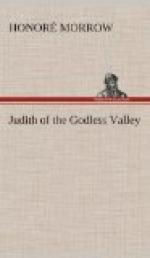Douglas grunted. “I wouldn’t worry about getting married for a few years yet.”
“I’m fourteen,” returned Judith. “I’ve got a right to think about it. Don’t you ever?”
“No.”
“You think about girls, though,” insisted Judith.
“That isn’t thinking about marrying, is it?”
“What do you think about mostly, Doug?”
Douglas sighed. “It’s hard to say. I’ve been awful sad lately. I don’t know why. I think about that and I plan a lot about what I’m going to do when I finish school.”
“Would you like to marry Maud Day?”
“Who’s talking about marrying!” shouted Doug with sudden and overwhelming exasperation. “What makes you such a fool, Jude?”
“How can I help talking about it when it’s my mother your father’s so rough with. Of course, you don’t care.”
“I do, too, care. I think a lot of her, but he don’t mean half he says.”
“Well, he’d better begin to stop knocking me around when he’s mad, or I’ll run away.”
“Especially in the winter, I suppose,” sniffed Douglas, “when it would be plain suicide.”
“I don’t care if it’s in a blizzard,” insisted Judith. “When I’ve had enough, I’ll go.”
Douglas laughed. “Hanged if I don’t think you would, too, Jude. You’ve got the nerve of a wolverine.”
“I hope Dad’s tooth is better,” said Judith, as dim buildings and a lighted window shone though the dusk.
“Are you really afraid of Dad?” asked Douglas suddenly.
“No,” replied Judith, thoughtfully, “but sometimes I hate him.”
“I think he’s a pretty good old scout in spite of his temper,” said the boy.
“Well,” admitted Judith, “I guess I do too. At least, I can see why so many women like him. He’s awful good-looking. I can see that now I’m growing up.”
“Growing up!” mocked Douglas.
But before Judith could pick up the gauntlet, the horses came to pause before the lighted window. Judith jumped from Swift, unsaddled her and turned her into the corral. Then she went hurriedly into the house. Douglas unsaddled more slowly, and strode toward the sheds where calves were bellowing and cows lowing.
For half an hour he worked in the starlight, throwing alfalfa to the crowding stock. It was so cold that by the time he had finished he scarcely could turn the door-knob with his aching fingers. He entered the kitchen.
It was a large room, with the log walls neatly chinked and whitewashed. An unshaded kerosene lamp burned on the big table in the middle of the room. Judith was cutting bread. The air was heavy with smoke from frying beef. A tall, slender woman, with round shoulders, stood over the red-hot stove, stirring the potatoes. She was a very beautiful, very worn edition of Judith, though one wondered if she ever burned with even a small portion of Judith’s eager, wistful fires. She turned as Douglas came in and gave him a quick smile.




